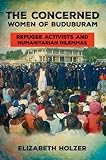The Concerned Women of Buduburam : Refugee Activists and Humanitarian Dilemmas / Elizabeth Holzer.
Material type: TextPublisher: Ithaca, NY : Cornell University Press, [2015]Copyright date: ©2015Description: 1 online resource (208 p.) : 1 halftone, 1 tableContent type:
TextPublisher: Ithaca, NY : Cornell University Press, [2015]Copyright date: ©2015Description: 1 online resource (208 p.) : 1 halftone, 1 tableContent type: - 9781501701214
- Humanitarian assistance -- Ghana
- Refugee camps -- Ghana
- Refugees -- Political activity -- Ghana
- Refugees -- Liberia
- African Hist & Diaspora
- Sociology & Social Science
- SOCIAL SCIENCE / Sociology / General
- refugees, refugee crisis, Ghana, Buduburam Refugee Camp, refugee activism, Liberian civil war, civic engagement, transnational government, administrative caregiving, political legitimacy, contentious politics, repression, humanitarian aid, humanitarian politics, humanitarian intervention
- 362.87/809667 23
- online - DeGruyter
| Item type | Current library | Call number | URL | Status | Notes | Barcode | |
|---|---|---|---|---|---|---|---|
 eBook
eBook
|
Biblioteca "Angelicum" Pont. Univ. S.Tommaso d'Aquino Nuvola online | online - DeGruyter (Browse shelf(Opens below)) | Online access | Not for loan (Accesso limitato) | Accesso per gli utenti autorizzati / Access for authorized users | (dgr)9781501701214 |
Frontmatter -- Contents -- Acknowledgments -- Introduction -- Part I. Everyday Politics in Crisis -- 1. Achieving Everyday Life in Humanitarian Crisis -- 2. Civic Engagement in the Refugee Camp -- 3. Bifurcated Governmentality -- Part II. Contentious Politics in Crisis -- 4. The Concerned Women Protests -- 5. Refugee Dissent as a Social Problem -- 6. Legitimacy in Repression’s Aftermath -- Conclusion -- Methodological Appendix -- References -- Index
restricted access online access with authorization star
http://purl.org/coar/access_right/c_16ec
In The Concerned Women of Buduburam, Elizabeth Holzer offers an unprecedented firsthand account of the rise and fall of social protests in a long-standing refugee camp. The UN High Commissioner for Refugees (UNHCR) and the host government of Ghana established the Buduburam Refugee Camp in 1990 to provide sanctuary for refugees from the Liberian civil war (1989–2003). Long hailed as a model of effectiveness, Buduburam offered a best-case scenario for how to handle a refugee crisis. But what happens when refugees and humanitarian actors disagree over humanitarian aid? In Buduburam, refugee protesters were met with Ghanaian riot police. Holzer uses the clash to delve into the complex and often hidden world of humanitarian politics and refugee activism.Drawing on fifteen months of ethnographic fieldwork in Ghana and subsequent interviews with participants now returned to Liberia, Holzer exposes a distinctive form of rule that accompanies humanitarian intervention: compassionate authoritarianism. Humanitarians strive to relieve the suffering of refugees, but refugees have little or no access to grievance procedures, and humanitarian authorities face little or no accountability for political failures. By casting humanitarians and refugees as co-creators of a shared sociopolitical world, Holzer throws into sharp relief the contradictory elements of humanitarian crisis and of transnational interventions in poor countries more broadly.
Mode of access: Internet via World Wide Web.
In English.
Description based on online resource; title from PDF title page (publisher's Web site, viewed 26. Apr 2024)


